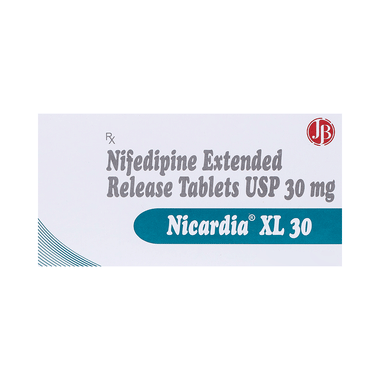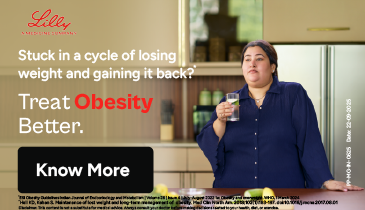Folcardia XL 30 Tablet
 Prescription Required
Prescription Required

Product introduction
Folcardia XL 30 Tablet may be prescribed alone or along with other medicines. Your doctor will decide the dose and duration of the treatment. Your doctor may adjust the dose depending on how you respond to this medicine and your blood pressure levels. You can take it at any time of the day, with or without food, but it is best to take it at the same time each day.
Keep taking it for as long as advised by your doctor. Even if you feel well, do not stop this medicine on your own because high blood pressure often has no symptoms. If you stop taking it, your condition may get worse. Maintaining an active lifestyle through regular exercise, managing your weight, and consuming a healthy diet will also help regulate your blood pressure. Follow your doctor’s advice while taking this medicine.
The most common side effects include fatigue, edema (swelling), dizziness, unusual heartbeat (palpitations), flushing, constipation, and headache. Consult your doctor if any of these bother you or do not go away.
Before taking it, let your doctor know if you have any heart, liver, or kidney problems. Pregnant or breastfeeding women should also consult their doctor for advice before taking this medicine. You also need to tell your doctor what other medicines you are taking, especially those used to treat high blood pressure or heart conditions. Avoid excessive alcohol intake while taking this medicine, as it can significantly decrease your blood pressure and make you feel dizzy or light-headed. You should have your blood pressure checked regularly to make sure that this medicine is working properly.
Uses of Folcardia Tablet ER
Benefits of Folcardia Tablet ER
In Treatment of Hypertension (high blood pressure)
In Prevention of Angina (heart-related chest pain)
Side effects of Folcardia Tablet ER
Common side effects of Folcardia
- Dizziness
- Fatigue
- Flushing (sense of warmth in the face, ears, neck and trunk)
- Headache
- Peripheral edema
How to use Folcardia Tablet ER
How Folcardia Tablet ER works
Safety advice
Folcardia XL 30 Tablet may make you feel dizzy, faint, extremely tired or have visual disturbances. This may affect your ability to drive.
However, talk to your doctor if you have any underlying kidney disease.
What if you forget to take Folcardia Tablet ER?
All substitutes
Quick tips
- Take it at the same time every day to help you remember to take it.
- A sudden drop in your blood pressure may occur, especially when you first start taking Folcardia XL 30 Tablet. To lower the chance of feeling dizzy or passing out, rise slowly if you have been sitting or lying down.
- It can cause ankle or foot swelling. To reduce the swelling, raise your legs while you are sitting down. Talk to your doctor if it does not go away.
- It may cause dizziness. Do not drive or perform any activity that requires mental focus until you know how Folcardia XL 30 Tablet affects you.
- Inform your doctor if you are pregnant, planning a pregnancy, or breastfeeding.
Fact Box
Interaction with drugs
Patient concerns
FAQs
Is Folcardia XL 30 Tablet a diuretic?
Is Folcardia XL 30 Tablet bad for kidneys?
Can Folcardia XL 30 Tablet cause liver damage?
Does Folcardia XL 30 Tablet affect blood sugar?
Can Folcardia XL 30 Tablet be used in pregnancy and nursing mothers?
Does Folcardia XL 30 Tablet cause palpitations?
Do I need to change my diet while taking Folcardia XL 30 Tablet?
My blood pressure is now controlled. Can I stop taking Folcardia XL 30 Tablet now?
Related ayurvedic ingredients
Disclaimer:
Tata 1mg's sole intention is to ensure that its consumers get information that is expert-reviewed, accurate and trustworthy. However, the information contained herein should NOT be used as a substitute for the advice of a qualified physician. The information provided here is for informational purposes only. This may not cover everything about particular health conditions, lab tests, medicines, all possible side effects, drug interactions, warnings, alerts, etc. Please consult your doctor and discuss all your queries related to any disease or medicine. We intend to support, not replace, the doctor-patient relationship.References
- Michel T, Hoffman BB. Treatment of Myocardial Ischemia and Hypertension. In: Brunton LL, Chabner BA, Knollmann BC, editors. Goodman & Gilman’s: The Pharmacological Basis of Therapeutics. 12th ed. New York, New York: McGraw-Hill Medical; 2011. pp. 757-58.
- Opie LH. Calcium Channel Blockers. In: Opie LH, Gersh BJ, editors. Drugs for the Heart. 8th ed. Philadelphia, Pennsylvania: Elsevier Saunders; 2013. pp. 84-86.
- Briggs GG, Freeman RK, editors. A Reference Guide to Fetal and Neonatal Risk: Drugs in Pregnancy and Lactation. 10th ed. Philadelphia, PA: Wolters Kluwer Health; 2015. pp. 978-79.
Marketer details
Lab tests offered by us











